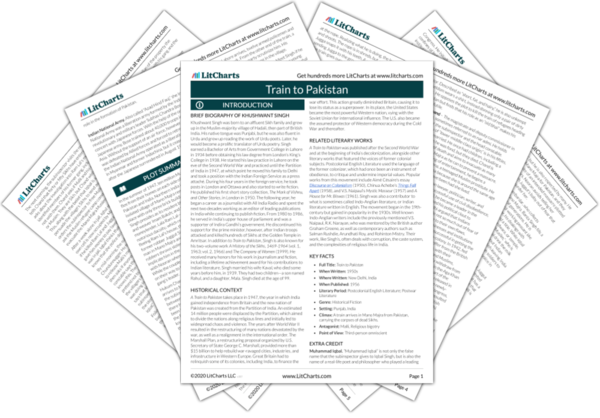Brief Biography of Khushwant Singh
Khushwant Singh was born to an affluent Sikh family and grew up in the Muslim-majority village of Hadali, then part of British India. His native tongue was Punjabi, but he was also fluent in Urdu and grew up reading the work of Urdu poets. Later, he would become a prolific translator of Urdu poetry. Singh earned a Bachelor of Arts from Government College in Lahore in 1934 before obtaining his law degree from London’s King’s College in 1938. He started his law practice in Lahore on the eve of the Second World War and practiced until the Partition of India in 1947, at which point he moved his family to Delhi and took a position with the Indian Foreign Service as a press attaché. During his four years in the foreign service, he took posts in London and Ottawa and also started to write fiction. He published his first short story collection, The Mark of Vishnu, and Other Stories, in London in 1950. The following year, he began a career as a journalist with All India Radio and spent the next two decades working as an editor of leading publications in India while continuing to publish fiction. From 1980 to 1986, he served in India’s upper house of parliament and was a supporter of Indira Gandhi’s government. He discontinued his support for the prime minister, however, after Indian troops attacked and killed hundreds of Sikhs at the Golden Temple in Amritsar. In addition to Train to Pakistan, Singh is also known for his two-volume work A History of the Sikhs, 1469-1964 (vol. 1, 1963; vol. 2, 1966) and The Company of Women (1999). He received many honors for his work in journalism and fiction, including a lifetime achievement award for his contributions to Indian literature. Singh married his wife Kaval, who died some years before him, in 1939. They had two children—a son named Rahul, and a daughter, Mala. Singh died at the age of 99.
Historical Context of Train to Pakistan
A Train to Pakistan takes place in 1947, the year in which India gained independence from Britain and the new nation of Pakistan was created from the Partition of India. An estimated 14 million people were displaced by the Partition, which aimed to divide the nations along religious lines and initially led to widespread chaos and violence. The years after World War II resulted in the restructuring of many nations devastated by the war, as well as a realignment in the international order. The Marshall Plan, a restructuring proposal organized by U.S. Secretary of State George C. Marshall, provided more than $15 billion to help rebuild war-ravaged cities, industries, and infrastructure in Western Europe. Great Britain had to relinquish some of its colonies, including India, to finance the war effort. This action greatly diminished Britain, causing it to lose its status as a superpower. In its place, the United States became the most powerful Western nation, vying with the Soviet Union for international influence. The U.S. also became the assumed protector of Western democracy during the Cold War and thereafter.
Other Books Related to Train to Pakistan
A Train to Pakistan was published after the Second World War and at the beginning of India’s decolonization, alongside other literary works that featured the voices of former colonial subjects. Postcolonial English Literature used the language of the former colonizer, which had once been an instrument of obedience, to critique and undermine imperial values. Popular works from this movement include Aimé Césaire’s essay
Discourse on Colonialism (1950), Chinua Achebe’s
Things Fall Apart (1958), and V.S. Naipaul’s
Mystic Masseur (1957) and
A House for Mr. Biswas (1961). Singh was also a contributor to what is sometimes called Indo-Anglian literature, or Indian literature written in English. The movement began in the 19th-century but gained in popularity in the 1930s. Well known Indo-Anglian writers include the previously mentioned V.S. Naipaul, R.K. Narayan, who was mentored by the British author Graham Greene, as well as contemporary authors such as Salman Rushdie, Arundhati Roy, and Rohinton Mistry. Their work, like Singh’s, often deals with corruption, the caste system, and the complexities of religious life in India.
Key Facts about Train to Pakistan
-
Full Title: Train to Pakistan
-
When Written: 1950s
-
Where Written: New Delhi, India
-
When Published: 1956
-
Literary Period: Postcolonial English Literature; Postwar Literature
-
Genre: Historical Fiction
-
Setting: Punjab, India
-
Climax: A train arrives in Mano Majra from Pakistan, carrying the corpses of dead Sikhs.
-
Antagonist: Malli, Religious bigotry
-
Point of View: Third-person omniscient
Extra Credit for Train to Pakistan








